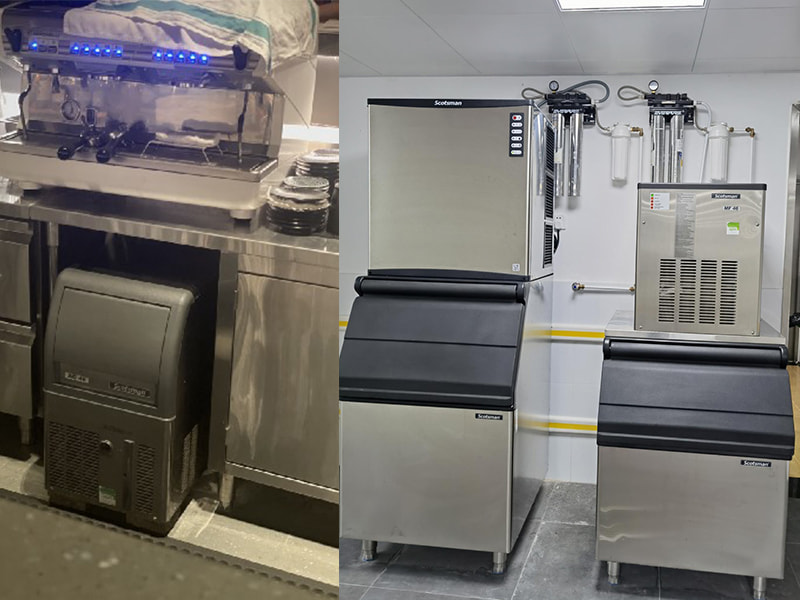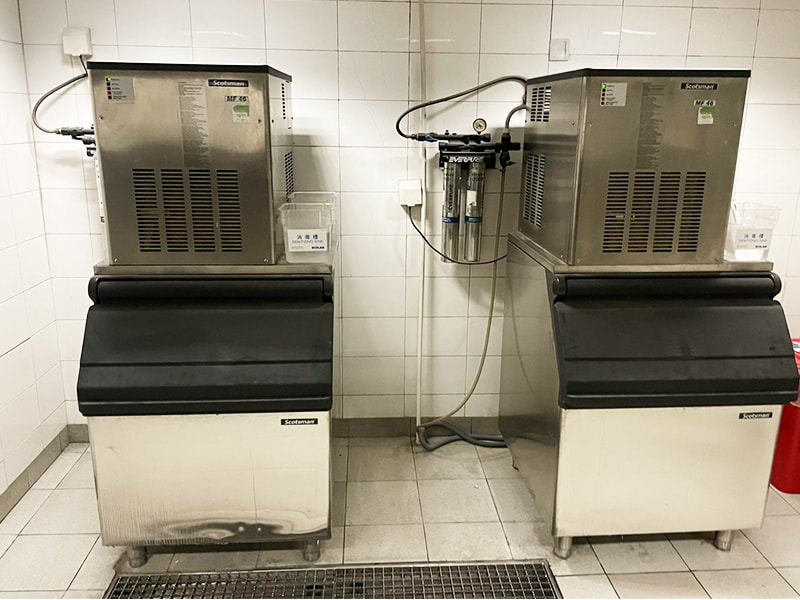10 Nov 2023
When it comes to using ice machine to produce ice, water quality is a crucial factor that is often overlooked. Many people assume that because ice is frozen, it doesn't need to be filtered. However, this couldn't be further from the truth. Ice is 100% water, and any impurities or contaminants in the water can affect the taste, smell, and appearance of the ice cubes. Even the slightest variance in water quality can result in cloudy, unappetizing ice that will ultimately melt into your beverages.
But why does water quality matter for ice production? Well, the answer is simple. Water contaminants such as dirt, sediment, and chlorine can all negatively impact the quality of the ice. These contaminants not only make the ice look and taste unpleasant, but they can also leave a bad aftertaste in your mouth.
Additionally, hard water minerals like calcium and magnesium can cause scale buildup in your ice maker, leading to costly maintenance fees and decreased efficiency. This scale can also affect the taste and clarity of the ice cubes.
That's why using a water purifier specifically designed for ice machines is essential. These purifiers are designed to remove impurities, sediment, chlorine, and hardness minerals from the water, ensuring that your ice is crystal clear, great-tasting, and free from any unpleasant odors.
Investing in a water purifier for your ice machine not only improves the quality of your ice but also extends the lifespan of your equipment. With cleaner water, you'll experience fewer service calls and less downtime, ultimately saving you money in the long run.
In the next section, we'll delve deeper into how water contaminants can affect the quality of ice and why it's crucial to address these issues with a water purifier for your ice machine.

When it comes to ice production, water quality plays a crucial role in determining the taste, smell, and appearance of the ice cubes. Many people overlook the importance of water quality in ice production, assuming that freezing the water will eliminate any contaminants. However, this is far from the truth.
Water contaminants, such as sediment and other unseen particles, can cloud the ice and make it look unappetizing. These contaminants not only affect the visual appeal of the ice cubes but also alter their taste. Imagine serving your customers a refreshing drink with ice cubes that have an unpleasant odor and taste - it's not a pleasant experience.
One of the most common contaminants found in water is chlorine, which is often added during the water treatment process. While chlorine helps disinfect the water, it can leave a strong chemical taste in the ice cubes, making them less enjoyable. Additionally, hard water minerals like calcium and magnesium can create scale buildup on the ice maker, leading to malfunctions and costly maintenance fees.
To ensure the production of high-quality ice, it is essential to remove these contaminants from the water. This is where a water purifier for ice machines comes in handy. By using a water purifier specifically designed for ice machines, you can effectively eliminate dirt, chlorine, and hardness minerals from the water, resulting in clearer, crisper ice cubes.
Investing in a water purifier for your ice machine not only improves the quality of your ice but also saves you time, frustration, and money in the long run. With cleaner water, you can provide your customers with refreshing drinks that are free from unpleasant tastes and odors. So, don't overlook the importance of water purification for your ice machine - it's the key to serving the best ice in town.
When it comes to producing high-quality ice for your beverages, using a water purifier for your ice machine can make all the difference. Not only does it ensure that your ice is crystal clear and free from any unwanted odors or flavors, but it also helps to extend the lifespan of your ice machine and reduce maintenance costs.
One of the main benefits of using a water purifier is that it removes contaminants from the water before it enters the ice machine. This means that any dirt, sediment, or other impurities that could cloud your ice and affect its taste and appearance are effectively filtered out. No one wants to serve their customers drinks with unappetizing ice cubes, and a water purifier ensures that your ice always looks and tastes its best.
In addition to improving the quality of your ice, a water purifier also helps to protect your ice machine from scale buildup. Hard water minerals like calcium and magnesium can accumulate on machine surfaces and components, leading to clogs and malfunctions. By using a water purifier that includes scale control or a water softener, you can prevent these issues and save yourself from costly repairs and downtime.
Furthermore, investing in a water purifier for your ice machine demonstrates your commitment to providing the best possible experience for your customers. It shows that you prioritize cleanliness, taste, and overall quality, which can help to enhance your reputation and attract more patrons to your establishment.
In conclusion, the benefits of using a water purifier for your ice machine are clear. It ensures that your ice is of the highest quality, extends the lifespan of your machine, reduces maintenance costs, and enhances your overall customer experience. Don't settle for anything less than the best when it comes to ice production - invest in a water purifier today.
When it comes to choosing the right water purifier for your ice machine, there are several options available. Each type of water purifier has its own unique features and benefits that cater to different needs and preferences. Here are some popular types of water purifiers for ice machines:
Carbon Filters: Carbon filters are commonly used in water purifiers for ice machines. They are effective in removing chlorine, sediment, and other impurities from the water, resulting in cleaner and better-tasting ice. Carbon filters are easy to install and maintain, making them a convenient choice for many users.
Reverse Osmosis Systems: Reverse osmosis systems are known for their ability to remove a wide range of contaminants from water, including dissolved solids, heavy metals, and bacteria. These systems use a semi-permeable membrane to filter out impurities, producing high-quality water for ice production. While reverse osmosis systems are more expensive and require professional installation, they offer superior purification performance.
UV Sterilizers: UV sterilizers use ultraviolet light to kill bacteria, viruses, and other microorganisms in the water. These systems are highly effective in ensuring the safety and purity of the water used in ice production. UV sterilizers are often used in conjunction with other water purification methods to provide comprehensive protection against contaminants.
Scale Inhibitors: Scale inhibitors are designed to prevent the buildup of mineral scale in ice machines. These inhibitors use special chemicals or physical processes to prevent the formation of scale, which can negatively impact the performance and efficiency of the ice machine. Scale inhibitors are particularly useful in areas with hard water, where mineral deposits are more common.
When choosing a water purifier for your ice machine, consider factors such as water quality, maintenance requirements, and budget. Consulting with a water treatment specialist can help you select the right purifier that meets your specific needs. Remember, investing in a high-quality water purifier will not only improve the quality of your ice but also extend the lifespan of your ice machine, saving you money in the long run.
When it comes to choosing the right water purifier for your ice machine, there are a few key factors to consider. The first and most important is the type of contaminants that need to be removed from the water. Different water sources have different levels of impurities, so it's crucial to select a purifier that can effectively target those specific contaminants.
One popular option is a filtration system that removes sediment, chlorine, and other chemicals that can affect the taste and appearance of ice cubes. These systems often use activated carbon filters, which are highly effective at removing impurities and improving the overall quality of the water.
Another consideration is the capacity of the water purifier. Ice machines come in various sizes, and it's essential to choose a purifier that can handle the volume of water required for your specific machine. Additionally, some purifiers may require regular maintenance, such as filter replacements, so it's important to factor in these ongoing costs and responsibilities.
Lastly, it's worth exploring additional features and technologies that can enhance the performance of your water purifier. For example, some systems may include scale control or water softening capabilities, which can prevent the buildup of minerals and extend the lifespan of your ice machine.
To ensure you make the right choice, it's always a good idea to consult with water treatment specialists who can provide expert guidance tailored to your specific needs. At Premiere Sales, our team of experts is available to assist you in selecting the perfect water purifier for your ice machine. Give us a call at (800) 817-6306 or email us at sales@PremiereSales.com for personalized assistance.
Remember, investing in a high-quality water purifier for your ice machine is a smart move that will not only result in exceptional ice quality but also save you money in the long run by reducing maintenance costs and equipment downtime. Choose wisely and enjoy the benefits of clean, great-tasting ice for your customers.

Keeping your water purifier for your ice machine in optimal condition is crucial for ensuring the production of clean and high-quality ice. Regular maintenance and timely replacement of filters are essential steps in maintaining the efficiency and effectiveness of your water purifier.
Regular Cleaning: It is important to clean your water purifier regularly to remove any build-up of impurities and contaminants. Follow the manufacturer's instructions for cleaning and sanitizing the system, and make sure to clean all components thoroughly.
Filter Replacement: The filters in your water purifier play a vital role in removing impurities and maintaining water quality. It is recommended to replace the filters at least every six months or as specified by the manufacturer. Regular filter replacement ensures that your ice machine continues to produce clean and great-tasting ice.
Monitoring Water Quality: Regularly test the water quality to ensure that the purifier is effectively removing contaminants. Conducting water tests will help you identify any issues with the purifier or the water source and take appropriate action.
Professional Servicing: Consider hiring a professional technician to service your water purifier periodically. They can inspect the system, perform any necessary repairs or adjustments, and ensure that it is functioning optimally.
Maintaining a Schedule: Create a maintenance schedule for your water purifier and stick to it. This will help you stay on top of filter replacements, cleaning, and any other maintenance tasks. Regular maintenance will extend the lifespan of your water purifier and ensure consistent ice quality.
Remember, the performance of your ice machine depends on the quality of the water it uses. By maintaining and replacing your water purifier regularly, you can ensure that your ice machine continues to produce clean, clear, and great-tasting ice for your customers.
Keywords: Water Purifier,Ice Machines
Originally published 10 Nov 2023, updated 10 Nov 2023.
Get a Project Quote
Our representative will contact you soon